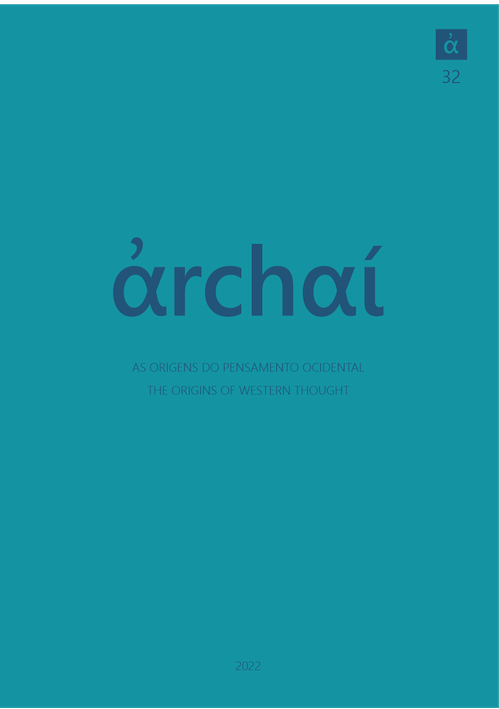Collective decision making in Euripides’ Supplices
DOI:
https://doi.org/10.14195/1984-249X_32_22Keywords:
Euripides, Supplices, collective decision making, warAbstract
In Supplices, one of Euripides' most political tragedies, a surprising approximation between the world of myth and that of the spectator is produced. AlthoughTheseus, its protagonist, is represented as a “democratic king”, it does not present a scene that can be compared to the experience of the most typical institution of Athenian democracy, the collective deliberation that defines the assembly open to all citizens. However, at different times in the first episode, it comes pretty close. Thus, the aim of this paper is to discuss how this tragedy represents forms of deliberation and consensus, and so it investigates the intricacies of two scenarios that lead toan attack war policy developed in the drama, one in Argos, the other in Athens.
Downloads
References
ADORJANI, Z. (2014) Pindars sechste olympische Siegesode: Text, Einleitung und Kommentar. Leiden, Brill.
BALOT, R. (2004) Courage in the democratic polis. Classical Quarterly 54, n. 2, p. 406-23.
BALOT, R. (2010) Democratizing courage in classical Athens. In: PRITCHARD, D. M. (ed.) War, democracy and culture in classical Athens. Cambridge, Cambridge University Press, p. 88-108.
BILLINGS, J. (2021) The philosophical stage: drama and dialectic in classical Athens. Princeton/Oxford, Princeton University Press.BOWIE, A. M. (1997) Tragic filters for history: Euripides’ Supplices and Sophocles’ Philoctetes. In: PELLING, C. (ed.) Greek Tragedy and the Historian. Oxford, Clarendon, p. 39-62.
CARTER, D. M. The politics of Greek tragedy. Exeter, Bristol Phoenix, 2007.
COLLARD, C. (1975) Euripides: Supplices. 2 vol. Groningen, Bouma’s Boekhuis.
DIGGLE, J. (1981) Euripidis fabulae. Vol. 2. Oxford, Clarendon.DIGGLE, J. (ed.) (2021) The Cambridge Greek Lexikon. Cambridge, Cambridge University Press.
DUNN, F. M. (1996) Tragedy’s end: closure and innovation in Euripidean drama. Oxford, Oxford University Press.
ELMER, D. F. (2013) The poetics of consent: collective decision making & the Iliad. Baltimore, Johns Hopkins University Press.
GRETHLEIN, J. (2003) Asyl und Athen: di Konstruktion kollektiver Identität in der griechischen Tragödie. Stuttgart; Weimar, Metzler.
GRIFFITH, M. (1999) Sophocles: Antigone. Cambridge, Cambridge University Press.
HANINK, J. (2013) Epitaphioi mythoi and tragedy as encomium of Athens. Trends in Classics 5, n. 2, p. 289-317.
HESK, J. (2011) Euripidean Eubouliaand the Problem of Tragic Politics. In: CARTER, D. M. (ed.) Why Athens? A reappraisal of tragic politics. Oxford, Oxford University Press, p. 119–43.
HUBBARD, T. K. (1992) Remaking myth and rewriting history: cult tradition in Pindar's ninth Nemean. Harvard Studies in Classical Philology 94, p. 77–111.
KOVACS, D. (1996) Euripidea altera. Leiden, Brill.
KONSTAN, D. (2010) Ridiculing a popular war: old comedy and militarism in classical Athens. In: PRITCHARD, D. M. (ed.) War, democracy and culture in classical Athens.Cambridge: Cambridge University Press, p. 184-200.
MASTRONARDE, D. J. (1986) The optimistic rationalist in Euripides: Theseus, Jocasta, Teiresias. In: CROPP, M. et al. (eds.) Greek tragedy and its legacy: essays presented to D. J. Conacher. Calgary, University of Calgary Press, p. 201-11.
MENDELSOHN, D. Gender and the city in Euripides political plays. Oxford, Oxford University Press, 2002.
MICHELINI, A. (1991) The maze of the logos: Euripides, Suppliants 163-249. Ramus 20/21, p. 16-36.
MICHELINI, A. (1994) Political themes in Euripides’ Suppliants. American Journal of Philology 115, n. 2, p. 219-52.
MILLS, S. (2010) Affirming Athenian action: Euripides’ portrayal of military activity and the limits of tragic instruction. In: PRITCHARD, D. M. (ed.) War, democracy and culture in classical Athens. Cambridge, Cambridge University Press, p. 163-83.
MORWOOD, J. (2007) Euripides: Suppliant women. Warminster, Aris & Phillips.
PARKER, R. (1983) Miasma: pollution and purification in early Greek religion.Oxford, Clarendon Press.
PRITCHARD, D. M. (2010) The symbiosis between democracy and war: the case of ancient Athens. In: PRITCHARD, D. M. (ed.) War, democracy and culture in classical Athens. Cambridge, Cambridge University Press, p. 1-62.
PUCCI, P. (2016) Euripides’ revolution under cover: an essay. Cornell, Cornell University Press.
ROSENBLOOM, D. (1993) Shouting “fire” in a crowded theater: Phrynichos’s Capture of Miletos and the politics of fear in early Attic tragedy. Philologus 137, n. 2, p. 159-96.
SOURVINOU-INWOOD, C. (2003) Tragedy and Athenian religion. Lanham, Lexington Books.
STONEMAN, R. (1981) Pindar and the mythological tradition. Philologus 125, n. 1, p. 44-63.
TORRANO, J. (2016) Eurípides: teatro completo. Volume 2. São Paulo: Iluminuras.
WERNER, C. (2014) Futuro e passado da linhagem de ferro em Trabalhos e dias: o caso da guerra justa. Classica 27, n. 1, p. 37-54.
WOHL, V. (2015) Euripides and the politics of form. Princeton, Princeton University Press.
ZEITLIN, F. I. (1990) Thebes: theater of self and society in Athenian drama. In: WINKLER, J.; ZEITLIN, F. (eds.) Nothing to do with Dionysos? Athenian drama in its social context. Princeton, Princeton University Press.
ZUNTZ, G. (1955) The political plays of Euripides. Manchester, Manchester University Press.
Downloads
Published
How to Cite
Issue
Section
License
Copyright (c) 2022 Christian Werner

This work is licensed under a Creative Commons Attribution 4.0 International License.
Given the public access policy of the journal, the use of the published texts is free, with the obligation of recognizing the original authorship and the first publication in this journal. The authors of the published contributions are entirely and exclusively responsible for their contents.
1. The authors authorize the publication of the article in this journal.
2. The authors guarantee that the contribution is original, and take full responsibility for its content in case of impugnation by third parties.
3. The authors guarantee that the contribution is not under evaluation in another journal.
4. The authors keep the copyright and convey to the journal the right of first publication, the work being licensed under a Creative Commons Attribution License-BY.
5. The authors are allowed and stimulated to publicize and distribute their work on-line after the publication in the journal.
6. The authors of the approved works authorize the journal to distribute their content, after publication, for reproduction in content indexes, virtual libraries and similars.
7. The editors reserve the right to make adjustments to the text and to adequate the article to the editorial rules of the journal.



